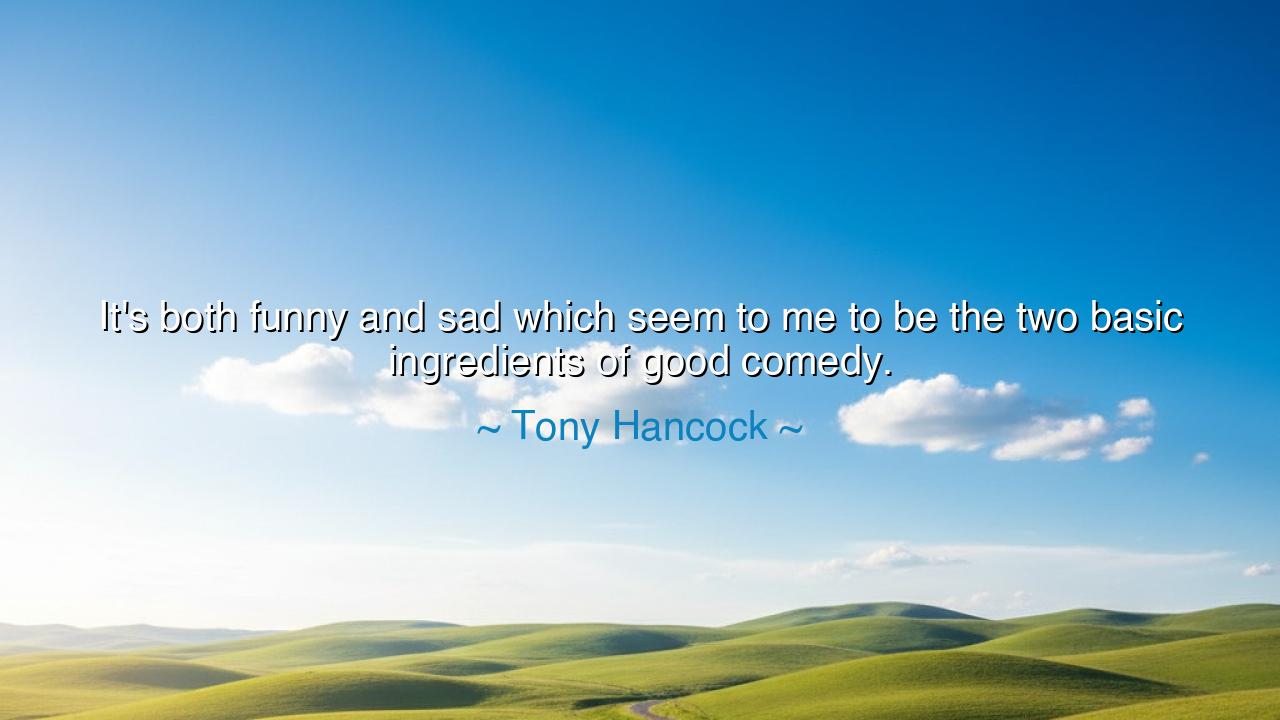
It's both funny and sad which seem to me to be the two basic
It's both funny and sad which seem to me to be the two basic ingredients of good comedy.






In the words of Tony Hancock, “It’s both funny and sad which seem to me to be the two basic ingredients of good comedy.” Within this simple declaration lies a profound understanding of the human condition, one that the ancients themselves would have recognized and honored. For what is life, if not a mixture of laughter and sorrow, of triumph and defeat intertwined like twin threads in the same tapestry? Hancock, a master of melancholy humor, understood that true comedy does not arise from perfection or bliss, but from the fragile and noble struggle of being human. It is in the collision of joy and pain, of the ridiculous and the tragic, that the deepest laughter is born — not laughter that mocks, but laughter that heals.
In the great halls of ancient Greece, where tragedy and comedy were born, the people knew that these two were not enemies, but siblings. The masks of Thalia and Melpomene, the muses of comedy and tragedy, were often displayed together, for each revealed what the other concealed. The Greeks understood what Hancock rediscovered centuries later: that laughter grows from sorrow like a flower from the grave. Without sadness, comedy becomes shallow; without laughter, sadness becomes unbearable. Hancock’s insight reminds us that humor is not an escape from pain — it is the transformation of pain into light. It is the alchemy of the soul, where tears are transmuted into joy through understanding.
Hancock himself was a man of contradictions — a comic genius haunted by melancholy. His performances, particularly in Hancock’s Half Hour, were not merely jokes but mirrors held up to the quiet despair of ordinary life. His characters were foolish yet noble, selfish yet yearning for meaning. When he spoke of “funny and sad” as the essence of comedy, he was speaking of his own truth: that to make others laugh, one must first understand sorrow. His humor was not the cruel laughter of mockery but the compassionate laughter of recognition. He did not laugh at humanity’s flaws — he laughed with them, and in doing so, made us feel less alone.
Consider the story of Charlie Chaplin, another artist who lived the same paradox. The Tramp, his immortal creation, walks through the world with tattered shoes and a flower in his hand — hungry, poor, humiliated, yet still smiling. His comedy is pure Hancockian truth: it is both funny and sad, for it springs from life’s absurd cruelty and from the indomitable heart that keeps walking anyway. When the Tramp slips on a banana peel, we laugh; when he looks up, bewildered but hopeful, we ache. That is the miracle of true comedy — it allows us to weep through our laughter, to feel the full weight of our humanity without despair.
To see both the comic and the tragic at once is to see life clearly. The wise soul does not deny sorrow nor cling to laughter alone, but recognizes that they complete one another. Comedy that lacks sadness is hollow, a trick without truth. Sorrow that lacks laughter is endless night. Hancock’s philosophy teaches us to live at the intersection of both — to laugh with compassion and to cry with understanding. In this way, the human heart remains resilient, neither hardened by suffering nor numbed by jest, but alive in its wholeness.
There is a certain nobility in this balance. To laugh amid pain is an act of courage. To find humor in failure, humility in absurdity — this is the art of the wise. Good comedy is not an escape from life but a way of embracing it more fully. It reminds us that imperfection is universal, that every soul stumbles, and that dignity can be found even in the ridiculous. When we laugh at ourselves, as Hancock so often invited us to do, we shed the armor of pride and reconnect with the simplicity of being human.
So, let the lesson be this: cherish both your laughter and your sorrow, for they are not opposites but allies. When the day feels heavy, seek the humor hidden within it; when laughter fills the air, remember the tender sadness that gives it depth. True joy does not come from escaping pain, but from understanding it and smiling anyway. The ancients would have said that this is wisdom — to find harmony between the tears and the smile, to live as one who knows that every jest hides a prayer, and every sigh hides a spark of laughter.
Practical teaching: Each day, allow yourself to feel both joy and sadness without shame. Watch the world with kind amusement; laugh not to forget, but to forgive. When you suffer, look for the absurdity that makes the pain bearable. When you laugh, let the laughter carry gratitude for the struggles that gave it meaning. In this way, you will live as Hancock did — not fleeing from life’s contradictions, but dancing with them. For in the end, it is only by embracing both the funny and the sad that we become whole — and only then does comedy become not just entertainment, but truth.






AAdministratorAdministrator
Welcome, honored guests. Please leave a comment, we will respond soon